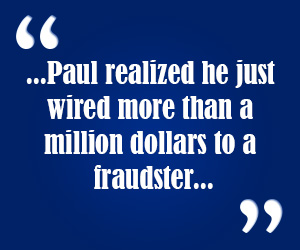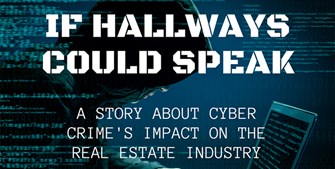There is a lot being written about cybersecurity and its impact on the real estate industry. Recently, at a national industry conference, the hallways were buzzing with stories about fraud schemes. One story, in particular, made everyone stop and think: "What would I do?"
A top settlement officer, named Paul, was handling the settlement on a multimillion dollar home. He personally signed the documents with the sellers. During the signing, the sellers presented wiring instructions for their seller's proceeds.
A couple of days before settlement, the sellers called Paul and, after making light conversation, told him that they were sending over updated wiring instructions and apologized for making the last-minute change. Paul, an award-winning professional, made a note that he had personally talked to the seller and then amended the wiring instructions on file.
On the settlement date, the necessary documents were recorded, then Paul audited the file and sent the wire for over a million dollars to the sellers. A few hours later, the sellers called him looking for the wire. As Paul started to speak, he could feel a knot welling up in his throat. He remembered receiving a call to amend the wiring instructions, but he now realized that he had not made the extra effort to contact the sellers at the previously known number or to meet them in person to verify and document the new instructions.

At that moment, Paul realized he just wired more than a million dollars to a fraudster, not to the sellers. He could have packed his desk and submitted his resignation at that point, but he did the right thing... the thing he was trained to do. He immediately called the appropriate people in his company, who took quick action to recover the funds.
Here are some things that all parties involved in real estate transactions should know:
- Cyber attacks and wire fraud are real. Attempts are being made every day to hack into email accounts to obtain details about real estate transactions so fraudsters can access funds.
- Never open or click on suspicious emails, attachments or links.
- Always use secure email accounts to communicate about real estate transactions.
- Always send or accept wire instructions through secure email. Verbally verify all wire instructions with the intended recipient.
- Title agents and settlement officers may insist on calling for verification, even though a party may have already provided the information. Understand that this is for the security and protection of the parties and funds involved.
- If documents or other settlement-related information is delivered in person, be prepared to show identification.
- Always communicate directly with the closing team involved in the transaction.
These days, it is important to work with a reputable company, like Old Republic Title. We continually take steps to protect nonpublic personal information, data and privacy to help ensure successful transactions.
This information is based on a true story. Names and identifying details have been changed to protect the privacy of individuals.




